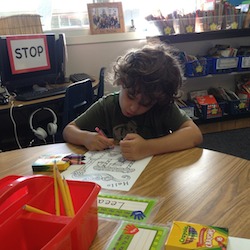by Caitlin Walker & Julia López-Robertson, The University of South Carolina
 This past summer I taught EDRD 797: Assessment for English Language Learners; our class met Monday through Thursday for three hours during the month of June. Naturally we spent time discussing assessment, testing, the Common Core and all things related — however our richest discussions centered on the young adult novels we read and the connections that my students made between the novels and the professional literature. I infuse young adult literature in all my courses as a means to provide my students with some insight into the lives of the children and families that they may be serving in their schools. This month’s blog will feature the voices of my graduate students; all share a desire to make their teaching accessible and equitable for all children and all have an interest in effectively teaching English Language Learners.
This past summer I taught EDRD 797: Assessment for English Language Learners; our class met Monday through Thursday for three hours during the month of June. Naturally we spent time discussing assessment, testing, the Common Core and all things related — however our richest discussions centered on the young adult novels we read and the connections that my students made between the novels and the professional literature. I infuse young adult literature in all my courses as a means to provide my students with some insight into the lives of the children and families that they may be serving in their schools. This month’s blog will feature the voices of my graduate students; all share a desire to make their teaching accessible and equitable for all children and all have an interest in effectively teaching English Language Learners.
The first book that we read, The Revolution of Evelyn Serrano (Manzano, 2012), took us into Spanish Harlem at a time of much political unrest. Marzano artfully invited us into Spanish Harlem and let us experience the stress, hope, and possibilities alongside the conflicted Evelyn Serrano and the Young Lords. Graduate student, Caitlin Walker offered this connection with the book:
As I began to read this book, my first thought was how much Evelyn reminded me of the students I see in the classroom. So often we assume that because a child’s family comes from a Spanish speaking country that they speak or read Spanish at home. Evelyn proves that this is a large misconception, while she understand a lot of Spanish, she hardly ever speaks it to her family throughout the story and at one point she even tell her grandmother that she does not understand everything her grandmother says in Spanish. This is further emphasized through her declaration that she wants to be called Evelyn on her fourteenth birthday. Throughout the story Evelyn moves from trying to reject her culture and become something different from her family by becoming more Americanized to accepting her past and her culture as an important part of who she is.
Furthermore, Evelyn’s mother also reminded me a lot of many of that parents who I see in schools. They want the best for their child but they do not want cause any problems. This is the situation that Evelyn’s mother finds herself in; she loves her daughter and the community that she lives in but she also remembers what it was like to live in Puerto Rico and how hard it was for her as a child. She is afraid of that disappearing and she wants to ensure that Evelyn never has that experience. She wants to give her a better life than her own, which is demonstrated by her dream to one day have her own house. As Pandya (2011) explains, parents cannot ask for something they do not know exists; she was talking about school programs but this also applies the “revolution” that the Young Lords were fighting for, such as free breakfasts and child-care. As Evelyn’s mother begins to see the good intentions of those fighting for her community; through bringing attention to the trash problem and starting programs for clothing drives and health care for those who could not afford it, she begins to soften and eventually participate. She begins to see that things she did not know about before are possible.
As Evelyn’s mother begins to see what is possible for her, this could turn into a wonderful project for the students. They can look at their own community and determine what changes they wish they could make. It does not have to be as grandiose as setting fire to the trash in their neighborhood. Instead it could be organizing a weekend or after school event to pick up the trash in a nearby park. In the last paragraph of the author’s note, Sonia Manzano writes, “When we think of revolutions, we think of big public displays of violence, but revolutions come in all shapes and sizes. I’ve always been interested in people’s internal revolutions because those the ones that govern their everyday actions and, by progression, a community’s life.” This is what we should be encouraging our own students to do. Begin their own revolutions, in the hearts, to allow them to choose how they want to make the world a better place.
How do you inspire your students to begin their own revolutions? How are you, as a teacher/teacher educator/student inspired to begin and/or continue your own revolutions?
References
Manzano, Sonia (2012) The Revolution of Evelyn Serrano. Scholastic Press
Pandya, Jessica Z. (2011). Overtested: How high stakes accountability fails English Language Learners, NY: TC Press
Please visit wowlit.org to browse or search our growing database of books, to read one of our two on-line journals, or to learn more about our mission.
- Themes: Caitlin Walker, Julia López-Robertson
- Descriptors: Debates & Trends, Student Connections, WOW Currents
